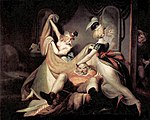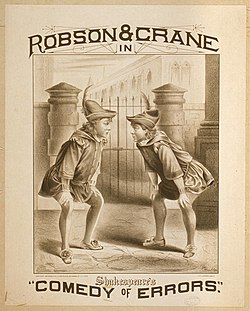In the First Folio, the plays of William Shakespeare were grouped into three categories: comedies, histories, and tragedies, though today many scholars recognize a fourth category, romance, to describe the specific types of comedies that appear as Shakespeare's later works.
"Comedy", in its Elizabethan usage, had a very different meaning from modern comedy. A Shakespearean comedy is one that has a happy ending, usually involving marriages between the unmarried characters, and a tone and style that is more light-hearted than Shakespeare's other plays. Patterns in the comedies include movement to a "green world", both internal and external conflicts, and a tension between Apollonian and Dionysian values. Shakespearean comedies tend to also include:
- A greater emphasis on situations than characters (this numbs the audience's connection to the characters, so that when characters experience misfortune, the audience still finds it laughable)
- A struggle of young lovers to overcome difficulty, often presented by elders
- Separation and re-unification
- Deception of characters (especially mistaken identity)
- A clever servant
- Disputes between characters, often within a family
- Interesting climax often with an unexpected twist
- Multiple, intertwining plots
- Use of all styles of comedy (slapstick, puns, dry humour, earthy humour, witty banter, practical)
- Pastoral element (courtly people living an idealized, rural life), originally an element of Pastoral Romance, exploited by Shakespeare for his comic plots and often parodied therein for humorous effects)
- Happy ending
Several of Shakespeare's comedies, such as Measure for Measure and All's Well That Ends Well, have an unusual tone with a difficult mix of humour and tragedy which has led them to be classified as problem plays. It is not clear whether the uneven nature of these dramas is due to an imperfect understanding of Elizabethan humour and society, a fault on Shakespeare's part, or a deliberate attempt by him to blend styles and subvert the audience's expectations. By the end of Shakespeare's life, he had written seventeen comedies. Cymbeline, listed in this article with the comedies, was, in the First Folio, included among the tragedies, even though it has many of the features of the so-called "late romances" (including a happy ending).
List of comedies by William Shakespeare

The plays are here according to the order in which they are given in the First Folio of 1623. Plays marked with an asterisk (*) are now commonly referred to as the 'romances'. Plays marked with two asterisks (**) are sometimes referred to as the 'problem plays'.
- All's Well That Ends Well**
- As You Like It
- The Comedy of Errors
- Love's Labour's Lost
- Measure for Measure**
- The Merchant of Venice**
- The Merry Wives of Windsor
- A Midsummer Night's Dream
- Much Ado About Nothing
- Pericles, Prince of Tyre*
- The Taming of the Shrew
- The Tempest*
- Twelfth Night
- The Two Gentlemen of Verona
- The Two Noble Kinsmen*
- The Winter's Tale*
- Cymbeline
References

